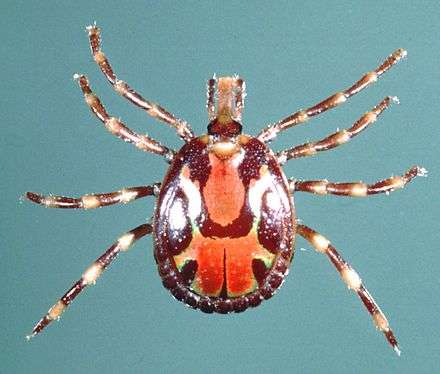Amblyomma variegatum
Amblyomma variegatum, commonly known as the tropical bont tick, is a species of tick of the genus Amblyomma endemic to Africa.[1] It has spread from its centre of origin to several countries, including the Caribbean islands, where it is known as the Senegalese tick (due to the suspected introduction of the tick from cattle imports from that country) and the Antigua gold tick. They are vividly coloured (especially the males) and have a substantial impact on livestock, primarily through their transmission of diseases. They are three-host hard ticks (where each life stage completes a blood meal on a particular host before dropping off and ecdysis) that have been found on a variety of domesticated species such camels, cattle, goats, sheep, dogs, and various species of wildlife.
| Amblyomma variegatum | |
|---|---|
 | |
| A male of Amblyomma variegatum | |
| Scientific classification | |
| Kingdom: | Animalia |
| Phylum: | Arthropoda |
| Subphylum: | Chelicerata |
| Class: | Arachnida |
| Subclass: | Acari |
| Order: | Ixodida |
| Family: | Ixodidae |
| Genus: | Amblyomma |
| Species: | A. variegatum |
| Binomial name | |
| Amblyomma variegatum (Fabricius, 1794) | |
References
- Tania Yonow (1995). "The life-cycle of Amblyomma variegatum (Acari: Ixodidae): a literature synthesis with a view to modeling". International Journal for Parasitology. 25 (9): 1023–1060. doi:10.1016/0020-7519(95)00020-3. PMID 8847166.
External links

- Tropical bont tick, on Featured Creatures website, Department of Entomology and Nematology, University of Florida
- Species Profile - Tropical Bont Tick (Amblyomma variegatum), National Invasive Species Information Center, United States National Agricultural Library.